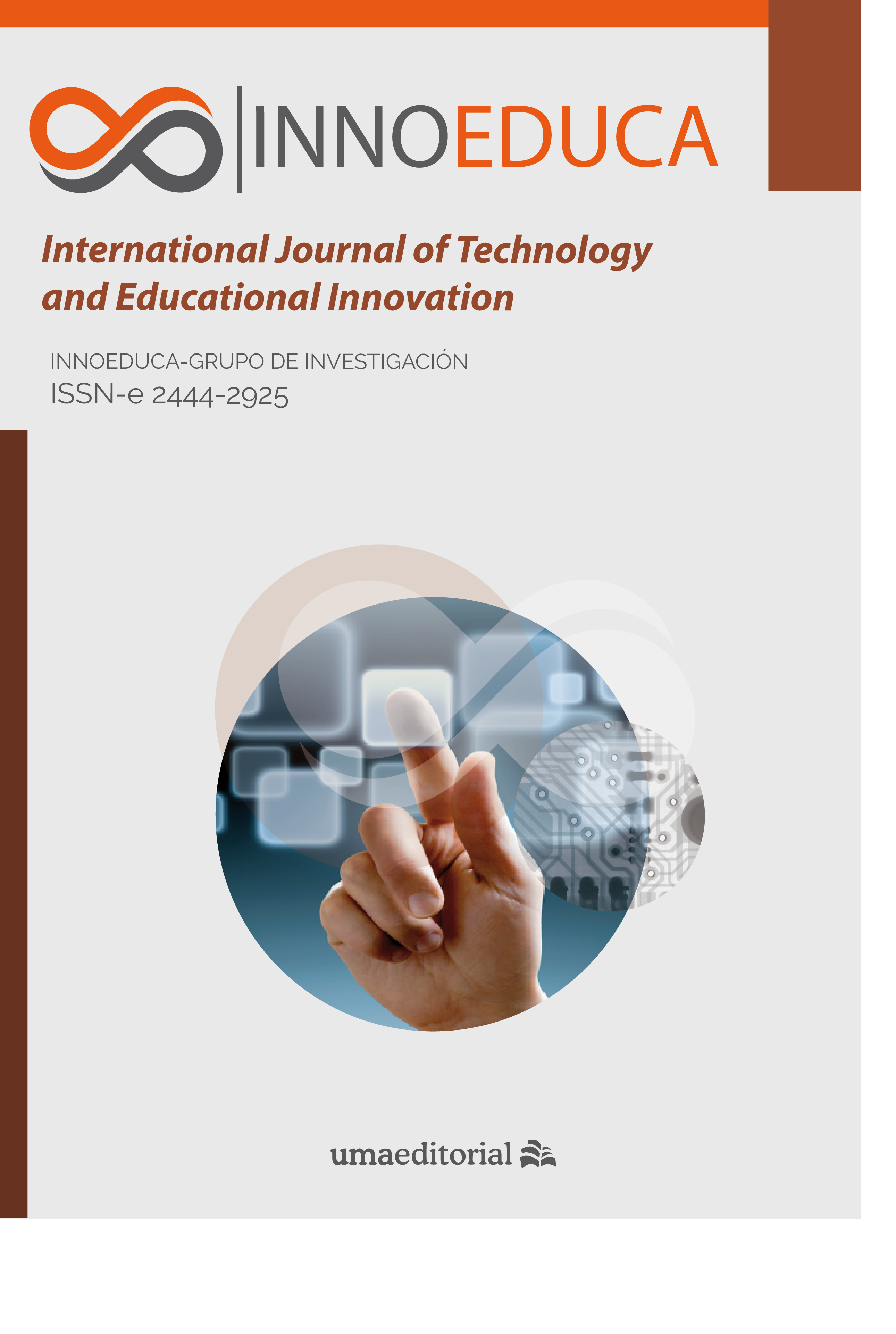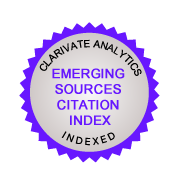The evaluation in the SPOC: analysis of models and instruments
DOI:
https://doi.org/10.24310/innoeduca.2021.v7i1.9417Keywords:
evaluation, evaluation methods, SPOC, online courses, distance education.Abstract
The evaluation varies according to the methodology and students to whom the teaching process is directed, since it is adapted to their context and level of instruction. In relation to the object of our study, SPOCs (Small Private Online Course), maintain different variations in terms of assessment models and instruments. The way of evaluating in the SPOC varies according to the students to whom the course is directed, the design of the SPOC itself and the approach that the teacher himself wants to give. The main objective of this research is to analyze the evaluation models and instruments that are implemented in SPOCs. The aim is to understand how assessment is carried out in SPOCs, through the most current lines of research. For this, the research has been carried out through a theoretical study of the current and specific bibliography on the subject. The results reflect a preference, in terms of purpose, for summative assessment. In relation to the moment of collecting information, the initial evaluation together with the final one, are the most used models. As for the evaluating agent, self-evaluation is the most widely implemented model. Among the instruments, self-evaluations and test-type tests are the most widely used tools to collect evidence on the learning process. In conclusion, despite the fact that the pedagogical characteristics of SPOCs favor the adoption of evaluation models and instruments, the agreement on evaluation models and tools is subordinated to the specific intention of each SPOC.
Downloads
Metrics
Publication Facts
Reviewer profiles N/A
Author statements
Indexed in
-
—
- Academic society
- N/A
- Publisher
- Universidad de Málaga
References
Baloco Navarro, C.P., & Ricardo Barreto, C.T. (2018). Los MOOC en la educación superior. Saber, ciencia y libertad, 13(2), 250-260.
Cabero Almenara, J. (2015). Visiones educativas sobre los MOOC. RIED. Revista Iberoamericana de Educación a Distancia, 18(2), 39-60. https://doi.org/10.5944/ried.18.2.13718
Caturla, E. (2010). Evaluar por competencias. Padres y Maestros / Journal of Parents and Teachers, (329), 14-16.
Colomo, E., & Domínguez, R. (2015). Definiendo Identidades: el “Canciograma” como Herramienta Metodológica de Autoconocimiento. REICE, Revista Iberoamericana sobre Calidad, Eficacia y Cambio en Educación, 13(2), 131-146.
Colomo, E., Fernández, J.M., Sánchez, E., & Trujillo, J.M. (2020). SPOC y formación del profesorado: aproximación bibliométrica y pedagógica en Scopus y Web of Science. Revista Electrónica Interuniversitaria de Formación del Profesorado, 23(2), 37-51. https://doi.org/10.6018/reifop.413541
Fu, Y. (2019). A «Maker education + SPOC» teaching model for college political economics courses. International Journal of Emerging Technologies in Learning, 14(3), 139-150. https://doi.org/10.3991/ijet.v14i03.10103
García Barrera, A., Gómez Hernández, P., & Monge López, C. (2017). La atención a la diversidad en los MOOCS: Una propuesta metodológica. Educación XX1: Revista de la Facultad de Educación, 20(2), 215-233. https://doi.org/10.5944/educxx1.19038
González Burgos, E.M., García García, L., Gómez Serranillos Cuadrado, M.P., Garcia Broncano, R., Sieteiglesias Mansilla, V., & Gómez Oliver, F. (2018, junio 7). Creación de un SPOC (Small Private Open Course) colaborativo entre docentes y estudiantes para la mejora del aprendizaje de la Farmacología [Proyecto de Innovación Docente]. https://eprints.ucm.es/47950/
Iño Daza, W. G. (2018). Investigación educativa desde un enfoque cualitativo: La historia oral como método. Voces de la Educación, 3(6), 93-110.
Jong, J.P. (2016). The effect of a blended collaborative learning environment in a small private online course (SPOC): A comparison with a lecture course. Journal of Baltic Science Education, 15(2), 194-203.
Kang, Z., & He, L. (2018). Construction and Practice of SPOC Teaching Mode based on MOOC. International Journal of Emerging Technologies in Learning (IJET), 13(12), 35-49.
López de la Serna, A., Castaño Garrido, C., & Herrero Fernández, D. (2018). Integración de los cursos SPOC en las asignaturas de grado. Una experiencia práctica. Píxel-bit. Revista de Medios y Educación, (52), 139-149. https://doi.org/10.12795/pixelbit.2018.i52.10
López de la Serna, A., & Garrido, C.C. (2018). Estudio de las emociones, el aprendizaje autorregulado y la motivación en un curso SPOC. IJERI: International Journal of Educational Research and Innovation, (10), 299-316.
López de la Serna, A., & Tejada Garitano, E. (2019). Análisis del nivel de aprendizaje autorregulado dentro de un curso SPOC en una asignatura de grado. Hekademos: revista educativa digital, (27), 39-49.
Lu, H. (2018). Construction of SPOC-based Learning Model and its Application in Linguistics Teaching. International Journal of Emerging Technologies in Learning (IJET), 13(02), 157-169.
Mailhes, V., & Raspa, J. (2015). MOOC: De la revolución educativa a la supervivencia. Letra. Imagen. Sonido: Ciudad Mediatizada, (14), 75-91.
Maldonado Gil, L. (2011). ¿En qué consiste evaluar? Pedagogía Magna, (11), 142-149.
Mayorga Fernández, M.J., & Madrid Vivar, D. (2011). Metodología de evaluación de los cursos on line. Revista DIM: Didáctica, Innovación y Multimedia, (20), 1-12.
Mejón, A., Utray, F., & Rodríguez Mateos, D. (2018). Opiniones y propuestas de los estudiantes de Comunicación Audiovisual sobre los SPOC. RIED: revista iberoamericana de educación a distancia, 21(2), 305-324.
Méndez García, C.M. (2013). Diseño e implementación de cursos abiertos masivos en línea (MOOC): Expectativas y consideraciones prácticas. RED: Revista de Educación a Distancia, (39), 4-19.
Nodos y Nudos, R. (2004). ¿Evaluar para mejorar? Nodos y Nudos, 2(17), e 17. https://doi.org/10.17227/01224328.1226
Peñafiel Aguilar, M.G. (2018). Aportaciones para la mejora de la educación virtual en la enseñanza de la ingeniería [Tesis Doctoral]. Universitat d’Alacant, Alicante, España. https://dialnet.unirioja.es/servlet/tesis?codigo=146839
Romero Farfán, L.J. (2007). Concepciones de evaluación y de evaluación docente. Cuadernos de Lingüística Hispánica, (10), 137-148.
Ruiz Bolívar, C. (2015). El MOOC: ¿un modelo alternativo para la educación universitaria? Apertura: Revista de Innovación Educativa, 7(2), 110-131.
Ruiz-Palmero, J., López-Álvarez, D., & Sánchez-Rivas, E. (2021). Revisión de la producción científica sobre MOOC entre 2016 y 2019 a través de SCOPUS. Pixel-Bit, Revista de Medios y Educación, (60), 95-107. https://doi.org/10.12795/pixelbit.77716
Sánchez, E. (2013). De la tiza a la pizarra digital. En J. Sánchez y J. Ruiz (Eds.), Recursos didácticos y tecnológicos en educación (pp. 143-157). Síntesis.
Santamaría Lancho, M. (2014). Moocs y Spocs (Small Private Online Courses): Sus posibilidades para la Formación del Profesorado. Hamut´ay, 1(1), 6-17.
Song, Q.P., Fang, H.G., Teng, Y., & Jiao, B.C. (2016). Analysis and Research about Characteristics of Online Learning Behaviours of SPOC Learners. ITM Web of Conferences, 7, 04011. https://doi.org/10.1051/itmconf/20160704011
Uijl, S., Filius, R., & Ten Cate, O. (2017). Student Interaction in Small Private Online Courses. Medical Science Educator, 27(2), 237-242. https://doi.org/10.1007/s40670-017-0380-x
Utray, F., Mejón, A., & Rodríguez Mateos, D. (2018). Los SPOC en los estudios de Comunicación Audiovisual. Utilidad percibida por los estudiantes para las clases de contenido práctico. En I. Postigo, M.J. Recorder (Coords.), Los y las tics en los estudios de comunicación (pp. 209-216). Atic.
Vaysse, C., Chantalat, E., Beyne-Rauzy, O., Morineau, L., Despas, F., Bachaud, J.M., Caunes, N., Poublanc, M., Serrano, E., Bugat, R., Bugat, M.E. R., & Fize, A.L. (2018). The Impact of a Small Private Online Course as a New Approach to Teaching Oncology: Development and Evaluation. JMIR Medical Education, 4(1), e6. https://doi.org/10.2196/mededu.9185
Yu, J. (2019). Analysis and Design of Course Website for Software Testing Based on SPOC. Journal of Physics: Conference Series, 1187(5), 052015. https://doi.org/10.1088/1742-6596/1187/5/052015
Zhang, X.M., Yu, J.Y., Yang, Y., Feng, C.P., Lyu, J., & Xu, S.L. (2019). A flipped classroom method based on a small private online course in physiology. Advances in physiology education, 43(3), 345-349. https://doi.org/10.1152/advan.00143.2018
Zhu, Y., Zhang, W., He, Y., Wen, J., & Li, M. (2018). Design and Implementation of Curriculum Knowledge Ontology-Driven SPOC Flipped Classroom Teaching Model. Educational Sciences: Theory & Practice, 18(5), 1351-1374. https://doi.org/10.12738/estp.2018.5.034
Downloads
Published
How to Cite
Issue
Section
License
All contents published by Innoeduca. International Journal of Technology and Educational Innovation are subject to Creative Commons Attribution-Nocomercial-NoDerivatives 4.0 International License, whose complete text can be consulted at https://creativecommons.org/licenses/by-nc-nd/4.0/legalcode. Thus, copying, distribution, public communication, derivative works and commercial use of content are permitted as of the aforementioned issue provided that the source and the author of the text are cited.
It is the responsibility of the authors to obtain the necessary permits for images that are subject to copyright.

This work is licensed under a Creative Commons Attribution-NonCommercial-NoDerivatives 4.0 International License.













242.png)








